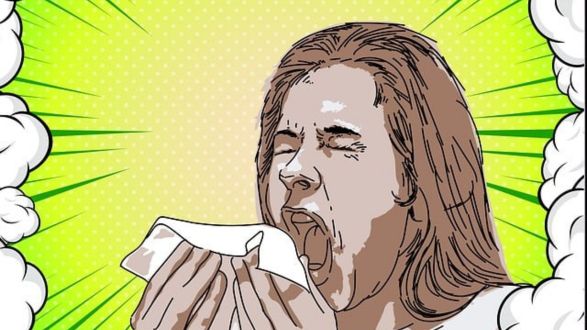Coughing is a protective reflex used to keep your airways open. You can be coughing due to swallowing issues or another medical condition, such as asthma or a respiratory infection. Your medical professional can assist you in determining the cause of the issue.

Overview
What is a cough?
Your body uses a cough as a natural reflex to clear irritants from the upper (throat) and lower (lungs) airways. Coughing aids in your body’s self-defense and healing.
What are the types of cough?
Coughs come in a variety of forms. Coughs have many names depending on how long they linger, how they feel or sound, or whether they are caused by specific medical issues.
Cough types and related to how they last:
1. An acute cough lasts for two to three weeks and starts abruptly.
2. A subacute cough lingers for three to eight weeks following an infection.
3. A persistent cough persists for more than eight weeks. Persistent coughs are another term for prolonged coughs.
4. A persistent cough that is unresponsive to medication is known as a resistant cough.
Cough types may be connected to mucus:
1. A cough that produces mucus or phlegm is referred to as a productive cough or wet cough.
2. A dry cough, also known as an ineffective cough, does not produce mucus or phlegm.
many kinds of coughs that sound different and are associated with particular ailments: (B)
1. Whooping: Whooping cough, also known as pertussis, is an infection that produces a cough that sounds like a “whoop.”
2. Barking: A barking cough may indicate that you have croup.
3. Wheezing: This kind of cough is frequently caused by obstructed airways. It may be linked to long-term illnesses like asthma or infections like the common cold.
Types of coughs associated with coughing:
1. Daytime cough.
2. Nighttime cough.
3. Throw up while coughing. This frequently occurs with kids. They cough so violently that they occasionally gag and throw up.
Who is more likely to experience a cough?
Coughing can affect everyone. The most frequent complaint made at doctor’s offices is a cough.
Coughs, however, are more common in certain persons than in others. Among them are people who:
1. Vape.
2. Smoke substances.
3. Have allergies.
4. Are children. Children are prone to illness, particularly if they attend daycare or school.
5. Having long-term medical conditions, particularly those affecting the brain system or lungs.
Possible Causes
What are the most typical reasons why people cough?
Numerous causes can induce coughing. Here are a handful of them:
Allergens or Irritants
1. Mold.
2. Dust.
3. Pollen.
4. Smoke.
5. Pet dander.
6. Mucus.
7. Strong smells.
8. Certain drugs, such as ACE inhibitors, are used to treat high blood pressure.
Medical conditions that can cause acute and subacute cough
1. Flu.
2. Sinusitis.
3. Pneumonia.
4. Cold.
5. Asthma.
6. Allergies.
7. Acute exposure to second- or third-hand smoking.
8. Whooping cough
9. Bronchiolitis or acute bronchitis.
illnesses that may result in a persistent cough
1. Asthma.
2. Allergies.
3. Chronic bronchitis.
4. Postnasal drip.
5. Lung disorders such as chronic obstructive pulmonary disease (COPD).
6. Gastroesophageal reflux disease.
7. Vocal cord disorders are among the disorders of the throat.
8. Heart problems, including heart failure.
Care and Treatment
How can a cough be managed or relieved?
The cause of a cough will determine how to treat it. Antiviral drugs are not usually necessary for viral coughs, but if you have an infection, your doctor may give you an antibiotic or another form of therapy. They may advise altering one’s diet or prescribing an H2 blocker or proton pump inhibitor for GERD.
When you have a cough, water helps. Drinking it can help reduce dryness or irritation in the throat that causes a cough. Other ways that water soothes a cough include by adding it to the air with a vaporizer or by taking a steamy shower.
Cough relief also involves avoiding other irritants and quitting smoking. Medications, smoking, allergies, and fragrances (such as candles or perfume) can all be considered irritants.
What over-the-counter treatments can I use for cough?
Adults can easily find over-the-counter cough syrups and cough treatments in plenty. They haven’t been demonstrated to function any better than a spoonful of honey in general. Butterscotch hard candies and cough medicines can also help relieve sore throats. Hot drinks like tea, especially if you add honey to it, may also provide you with relief.
If your child is younger than 6 years old, you should not give them cough medication without first getting their doctor’s approval.
How can cough be prevented?
Avoiding irritants that you know make you cough can help prevent some types of cough.
Infection-related coughs can be avoided by doing the following:
1. Getting vaccinations against pneumonia, COVID-19, and influenza.
2. Steering clear of sick folks.
3. Refrain from touching your lips, nose, or eyes.
4. Use hand sanitizers or frequently wash your hands with soap and water.
When to Call the Doctor
When should I contact my doctor if I have a cough?
For specific advice, you should contact your healthcare professional if you or your kid suffers from a chronic illness.
In general, if you experience any of the following symptoms along with a persistent cough, call your healthcare provider:
1. Wheezing, or the sound made when you exhale.
2. Chills.
3. Fever that reaches 101.5 degrees Fahrenheit or persists for longer than a couple of days.
4. Sputum, also known as thick mucus, or phlegm, particularly if it is green, yellow, or crimson.
If you have a cough and you: Go to the emergency hospital; or phone 911:
1. Have the sensation of choking.
2. Unable to breathe comfortably.
3. When you cough, a lot of blood appears.
4. Experience excruciating chest aches.
Additional Common Questions
How can I know whether the cough I have is severe?
Your healthcare provider will perform a physical examination, obtain a medical history, and maybe request tests to determine the cause of your cough. Your doctor will take your vital signs during the examination, including your temperature and breathing rate. If your cough has persisted for a long time, they may order a chest X-ray, check your oxygen levels, do a spirometry test in the office, or arrange lung function testing.
Your provider may ask:
1. If you currently use or have used marijuana, tobacco, or e-cigarettes?
2. Which type of employment do you do?
3. How much time have you spent coughing?
4. How well do you breathe throughout periods of high activity and relaxation?
5. If you have trouble falling asleep due to your cough?
6. If you cough and anything comes up?
7. which medications you take?
8. If you taste something unpleasant?
9. If your foul breath refuses to go gone?
10. If you’re in pain, particularly facial agony?
11. If you’ve managed to lose weight naturally?
Can pregnancy make you cough?
Although coughing is uncommon during pregnancy, your immune system does alter. This could indicate that you have a cold or cough while carrying a child. Furthermore, the cough or cold may persist longer.
If you experience difficulty breathing, eating, or sleeping, or your illness lasts longer than you anticipated, get in touch with your healthcare professional.
When I cough after eating, what does that mean?
Something may have “gone down the wrong way,” meaning it moved into your lungs rather than your stomach, if you cough after eating. Most of the time, the structure of our upper airways prevents food or liquids from entering our lungs completely. Food that gets directed toward the “wrong pipe” will cause you to cough, but most of the time it won’t hurt. Occasionally, substances you consume may manage to get past that barrier and enter your lungs. This is known as aspiration, and it may occur if you have dysphagia or other digestive or respiratory disorders. Inform your healthcare practitioner if you experience problems eating and coughing regularly.
A note from Blogjug
Coughing frequently indicates nothing serious. Coughing is common (and beneficial) in several circumstances. Coughing facilitates the removal of irritating or difficult-to-breathe objects from your throat and airways. Consult your healthcare practitioner for help if you experience any other symptoms, such as difficulty breathing, fever, difficulty eating or sleeping, or colored or bloody sputum coming up from your cough. It’s a good idea to call your child’s provider if they have a cough and fever or if their cough sounds uncomfortable or worrisome to you because small children can’t communicate what they’re feeling.









3 thoughts on “Cough: Symptoms, Causes, and Treatment Options”